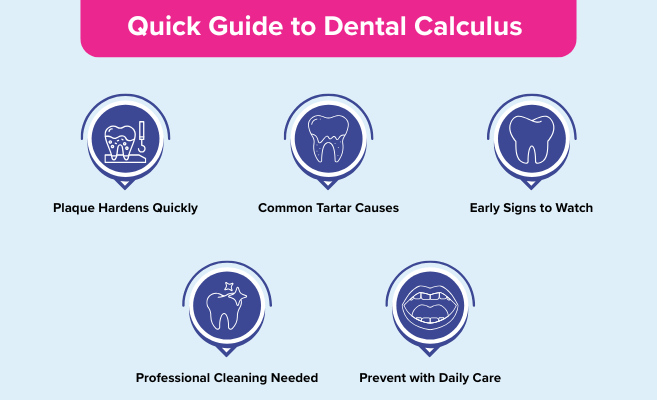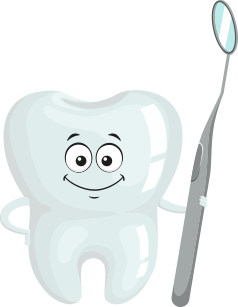Dental Calculus (Tartar)- Causes and Treatment

Have you noticed rough, yellowish or brownish deposits near your gums that brushing won’t remove? This is dental calculus, commonly known as tartar. It is hardened plaque that sticks firmly to your teeth and, if ignored, can damage your gums and overall oral health.
Understanding the Dental Calculus Causes, like plaque buildup that hardens due to minerals in saliva, is the first step in prevention. Brushing alone cannot remove tartar, which is why timely Dental Calculus Treatment by a professional dentist is crucial to keep your smile healthy and bright.
Dental calculus forms when soft plaque, a mix of bacteria and food particles, isn’t removed. It absorbs minerals from saliva and hardens within 24–72 hours. Unlike regular plaque, calculus is rough, porous, and tightly attached to the teeth. It can appear yellow, brown, or black and develop above or below the gum line. Since it cannot be removed by brushing, a visit to a reliable dental clinic in Medavakkam or a trusted dental clinic in Chennai becomes essential for its removal and prevention of gum problems.
How Dental Calculus Forms
Knowing Dental calculus causes that are related to the nature of your anatomy is a big help in the prevention of it. This is the stage:
- Plaque Formation: Bacteria combine with food remains and saliva to produce a sticky film on the teeth.
- Plaque Maturation: Microorganisms in the plaque consist of tiny groups, which get larger if the plaque is not cleaned correctly, thus thickening.
- Mineralization: Saliva supplies calcium and phosphate that give the plaque a hard cover after a few days.
- Tartar Buildup: The multi-layered coat that is adhered to the tooth surface is the origin of calculus.
Regular dental check-ups at a nearby dental clinic in Chennai or a well-equipped dental clinic in Medavakkam can catch these issues early and prevent serious complications.
Common Causes of Dental Calculus
There are many different reasons that may cause plaque to become tartar. You can think of various causes of this disease and hence be able to control and reduce the risk of disease:
- Neglect of Oral Hygiene: Not brushing and flossing daily or even doing it in the wrong way.
- High-Sugar or Starchy Diet: The bacteria in the mouth consume sugar in foods and drinks.
- Unhealthy Dental Visits: Missing a clean-up session by a professional gives space for accumulation.
- Dry Mouth (Low Saliva Flow): Saliva is the main source of the mouth’s natural defense system against food particles and bacteria.
- Smoking or the Use of Tobacco: Besides enabling tartar to be produced more, tobacco makes the teeth look yellow.
- Overcrowded or Misaligned Teeth: Teeth that are out of alignment are difficult to clean thereby making deposits occur.
- Age Factor: The elderly usually face the problem of calculus formation as a result of plaque that has been on their teeth for a long time.
How to Identify Dental Calculus
Recognizing calculus early can save you from serious oral health problems. Watch out for:
- Rough or hard deposits on teeth near the gum line.
- Stains of a yellowish or brown color that typical brushing of the teeth doesn’t remove.
- Unpleasant breath (halitosis) that continues to exist.
- Gums that look red, swollen, and tender, and bleed easily.
- Gums pulling away from teeth making more of the tooth visible.
- Tooth sensitivity is aggravated.
If you notice any of these signs, schedule a dental visit immediately.

Why Dental Calculus Needs Prompt Attention
Calculus isn’t just a cosmetic concern. Leaving it untreated can lead to:
- Gum Disease (Gingivitis and Periodontitis): Tartar on the teeth irritates the gums that surround them, and these being inflamed will bleed.
- Tooth Decay: The rough parts of the tooth become a breeding place for bacteria that eat the enamel.
- Bad Breath: Bacteria that accumulate on your mouth produce a smell that is made up of different volatile compounds.
- Tooth Loss: Gum infection in the severe stage caused by tartar accumulation can result in a tooth loss.
- Aesthetic Concerns: Your smile gets unattractive due to the stains your teeth have gotten from the inside and outside.
Early removal protects your oral health and keeps your smile bright.
Dental Calculus Treatment
Since calculus is firmly attached to teeth, professional cleaning is the only solution. Dentists use specialized tools to safely remove it. The main procedures include:
- Scaling: Removes visible and hidden tartar using ultrasonic or manual tools, leaving teeth clean and smooth.
- Root Planing: Smooths roots below the gums, reduces bacteria, and helps gums reattach.
- Polishing: Smooths tooth surfaces after cleaning to prevent plaque buildup and improve appearance.
- Antibacterial Rinses: Special gels or rinses may be recommended by the dentist to control bacteria and aid gum recovery.
Important: Never try to scrape off calculus yourself at home. It can injure your gums and cause infections.
Prevention of Dental Calculus
Preventing calculus formation is far more convenient than treating it. Here are some workable tips:
- Brush Twice a Day: Brush your teeth with a soft toothbrush and fluoride toothpaste.
- Floss Every Day: Flossing gets rid of the plaque deposits between the teeth that even brushing cannot remove.
- Mouthwash Rinse: An antibacterial rinsing can lessen the growth of plaque.
- Giving up Sweets: Cut down the sugar intake and thus, kill the bacteria that are the source of the decay.
- Water is Good for You: Drinking water actually helps remove the leftover food particles from the mouth.
- Stop Smoking: Don’t use tobacco which is the source of both calculus and gum diseases.
- Have a Dental Check-up Twice a Year: Regular inspections and professional cleanings are the key.
Dental Calculus in Children
Children can also develop calculus if they don’t follow proper oral hygiene. Parents should:
- Supervise brushing twice a day.
- Ensure regular dental visits.
- Limit sugary foods and drinks.
- Teach kids how to floss properly.
Early prevention in children can save them from future dental problems.
Gums are extremely sensitive to the accumulation of tartar. When calculus sticks to the gums, they may become swollen and bleed. Moreover, if this continues, gingivitis (the first stage of gum disease) can develop into periodontitis (a severe gum infection), an area of the supporting bone can be affected, and there can be a gradual loss of teeth. Healthy gums are the base for a healthy mouth, thus prevention of calculus is the main step in ensuring oral health for a lifetime.
Although proper home care can lessen the amount of plaque on teeth, a solid tartar can only be removed with a professional dental cleaning. The best way to keep your gums healthy is through a visit to a dependable dental clinic in Medavakkam, Chennai, which will also help in the early diagnosis of dental problems and provide you with a comfortable and healthier smile.
Radiant Dental Care, one of the best dental clinics in Chennai, fuses contemporary technology with a qualified dental team to perform thorough cleanings, give off preventive measures against calculus formation, and efficiently handle periodontal disease to give a wide range of patients solutions for all their dental needs.
Tips for Maintaining a Tartar-Free Smile
- Try to maintain a consistent daily oral care regimen.
- For extremely inaccessible areas, use interdental brushes.
- If the bristles of your toothbrush have visibly worn out, then do not wait for 3 months and get a new one.
- Choose a toothpaste that has been given the green light by dental associations.
- After eating, chewing a piece of sugar-free gum will definitely help your saliva to flow.
- Make sure you do a professional dental cleaning at least two times a year.
Conclusion!
Dental calculus is not merely an aesthetic issue; it can endanger the oral and gum health, gradually, if the problem is not removed. Knowing what dental calculus is, selecting the right dental calculus treatment will save you from pain, infection and tooth loss.
If you maintain good oral hygiene at home and get a dental cleaning done at least twice a year, you will be able to keep your teeth and gums healthy.
Make an appointment with Radiant Dental Care for the best care and professional tartar removal to ensure that your smile is safe and that you maintain your oral health for a long time.
Frequently Asked Questions:
Can dental calculus disappear by itself?
Answer. No. Once plaque is transformed into calculus, it is not removable by brushing and flossing. Only a dentist can do it in a safe manner.
How often should I get a professional scaling?
Answer. Depending on the oral hygiene, most people need a 6-month interval between the scaling, those with more tartar accumulation may require more frequent visits in order to get their dentist’s advice.
Is it true that the tooth is hurt after a scaling procedure?
Answer. No. When a qualified dentist does the scaling, only the removal of the deposits is done and without any harm to the enamel of the teeth.
Is it possible that tartar leads to tooth loss?
Answer. Yes. Tartar, if it becomes a long-term friend, can lead to gum disease and bone loss situations, which in the end, tooth loss will be the outcome.
What should I do to avoid the formation of tartar in my mouth in between dental visits?
Answer. Keep good oral hygiene with daily brushing and flossing, eat a balanced diet and stay away from smoking.

 +91 9513446186
+91 9513446186
